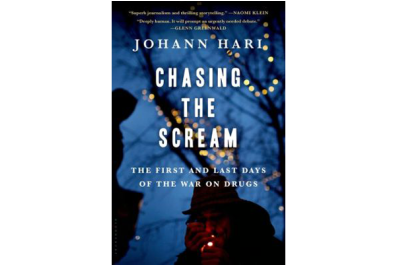Author: Johann Hari
ISBN: 978-1-62040-890-2
APA Style Citation
Hari, Johann (2015). Chasing the Scream: The First and Last Days of the War on Drugs. New York: Bloomsbury Publishing.
| chasing_the_scream_activity.pdf |
| chasing_the_scream_activity_key.pdf |
Johann Hari’s Chasing the Scream is a compelling if one-sided examination of the history of the war on drugs. The book is controversial because of an earlier plagiarism incident involving the author, the topic of decriminalizing drugs, the graphic depictions of cartel violence, and the physical, psychological, and social abuse suffered by addicts. These factors may make the book unsuitable for some high school students. In 2011, the author was found guilty of plagiarism and misrepresenting information from interviews. Furthermore, it was found out that the author spitefully altered the Wikipedia sites of his critics. In an attempt to alleviate concerns about credibility, the author includes 73 pages of detailed source notes and an explanation of his research process. On the books website, the author has shared audio files of fact-checking sessions with each of the figures quoted in the book who are still alive. The book website allows readers to hear the actual voices of the individuals whose 400 quotes fill the book. Some of the contributors’ photos are included in the quiz about the war on drugs on the main website.
Hari’s book is the result of three years of research that took him on a thirty-thousand-mile search to trace the history of the war on drugs, which began over 100 years ago. Much of the book is based on historical and current accounts of individuals impacted by the war on drugs. Hari begins by describing the interrelated factors that connect three key figures at the start of the drug war: Harry Anslinger the federal bureaucrat, Arnold Rothstein a New York criminal boss, and the singer Billie Holiday. The story begins with the birth of the American war on drugs, which was a byproduct of the end of prohibition in the 1920’s. Henry Anslinger became the head of the Bureau of Narcotics (today known as the DEA) and began the relentless pursuit of eliminating drugs. Anslinger would quickly expand his war on narcotics to include marijuana in addition to cocaine and heroin by playing on racism and fear. Anslinger also silenced any criticism, much of which came from doctors who were successfully treating heroin addicts through maintenance methods. Anslinger’s department forcibly closed many clinics and thousands of doctors were arrested for providing drugs to their patients. Most doctors were given heavy fines, but some were given prison terms (five years for each prescription). Hari argues that despite contrary views, Anslinger was able to impose his views on drugs onto the nation. Arnold Rothstein, whom Hari portrays as the original drug kingpin created the model for the modern drug cartel is another central figure in the history of the drug war. Rothstein controlled the drug trade and was able to accumulate enormous profits, which enabled him to buy and control politicians and law enforcement officers.
This process continues today and can be summed up with the phrase “plato o plomo” (silver or lead) coined by Mexican cartels suggesting that officials accept bribes or be killed. The war on drugs according to Hari has led to the control of drugs by dangerous criminals. Finally, Hari includes the singer Billie Holiday whom he portrays as one of the first victims of Anslinger’s war. Holiday’s troubled life and struggles with alcohol and heroin made her an early high-profile target of the man who launched the war on drugs. Based on research from diaries and other records, Hari outlines how Anslinger and his bureau relentlessly pursued Billie Holiday to make her an example for others.
The book chronicles the heart-wrenching stories of specific victims of the war on drugs from Billie Holiday to the present. The individuals portrayed include innocent victims caught in the crossfire, a transsexual crack dealer and gang leader in New York City, Roaslio Reta a former killer for the Zeta cartel, and the addicts in an Arizona women’s prison who endure hardships under Sherif Joe Arpaio who were forced to work chain gangs in 110 plus heat wearing t-shirts labeling them as DRUG ADDICT. The prisoners in Sherif Arpaio’s chain gangs were forced to chant the following:
We’re in a state of shame
Couldn’t get our lives strait
We’re headed back to intake
We’re here without our kids
We lost our hope
We gave up dope
Sherif Arpaio publicly calls the prison he runs his “concentration camp” and although there is an air-conditioned prison in the area, the inmates are forced to live in tents in the desert. The tents, which were donated by the military and date to the Korean War era, are freezing in winter and reach temperatures of 140 degrees in summer. Meanwhile, the sheriff has ordered the air-conditioned prison facility to be used as an animal shelter. In Chasing the Scream, the author tells the story of one Arizona prisoner, meth addict Marcia Powell, who was kept outside in a metal cage by guards with no water, no bed, no bench, and no cover from the 106-degree heat. She had been in solitary confinement where she swallowed a razor in a suicide attempt. 16 guards had the opportunity to help her, but she was left to die a horrific death in the cage in the desert. Hari describes how the United States imprisons more individuals for drug-related offenses than all of the nations of Western Europe imprison for all crimes.
The book also discusses the stories of many of the individuals who are fighting for a more just and humane solution to the problems of drug abuse. These individuals include individual family members, addicts, doctors, and government leaders. Marisela Escobedo, a mother in Mexico who sought justice for her child who was murdered by the cartel walked more than 1000 miles from Juarez to Mexico City to ask for assistance from President Calderon. Despite her long march through the desert and the exhaustion of her life savings, the President refused to meet with her. She later learned that a member of the Zeta cartel had murdered her son, which was why the killer was never prosecuted. Marisela refused to give up on her son and ended up being murdered by the cartel outside the state capitol building. Leigh Maddox, a state trooper involved with the Law Enforcement Against Prohibition (LEAP) advocates for a new approach to the war on drugs. LEAP is an organization of current and former police officers, judges, and prison officers who advocate for ending prohibition on drugs in order to bankrupt drug gangs. Bud Osborn, a poet and homeless addict who worked to bring change and rights for addicts in the Downtown Eastside neighborhood of Vancouver. Gabor Maté and Bruce Alexander, who proposed alternative theories of addiction, Ruth Dreifuss, former President of Switzerland, who supported and promoted decriminalization and the creation of heroin clinics.
Critics have challenged Hari’s criticism of biochemical theories of addiction as being oversimplified. But the book provides compelling case studies of individuals on the front lines of the drug war and highlights possible alternatives to the current model. The book ends with examples including Switzerland, Portugal, and the U.S. states of Colorado and Washington and their attempts to address the problems of drugs through decriminalization.
Although one-sided, Chasing the Scream will challenge you to think about the consequences and costs of the war on drugs.
Other Related Resources
Book Website
http://chasingthescream.com/
The website for Chasing the Scream includes audio of the quotes from sources used in the book organized chapter-by-chapter. Any individual quoted in the book was given the opportunity to review the material written by the author and correct mistakes or add information. The audio fact checking files allow the reader to have confidence in an author who has been previously found to have plagiarized sources. The site includes a quiz to test your knowledge of the war on drugs, information about the author, news stories, links to organizations protesting the war on drugs, and videos.
Author Johann Hari’s TED Talk
https://www.ted.com/talks/johann_hari_everything_you_think_you_know_about_addiction_is_wrong
Author Johann Hari’s 2015 TED talk about his book Chasing the Scream is his description of a compelling theory about the cause of addiction and why the current approach has not been effective.
Guardian article by Johann Hari
http://www.theguardian.com/books/2016/apr/12/johann-hari-chasing-the-scream-war-on-drugs
Bruce K. Alexander’s Website
http://www.brucekalexander.com/home-4
The website of Canadian psychologist Bruce K. Alexander whose research on rat park is featured in the book Chasing the Scream.
Law Enforcement Against Prohibition (LEAP)
http://www.leap.cc/
LEAP is a nonprofit organization consisting of current and former members of the law enforcement and criminal justice communities who oppose the war on drugs and policies that do not effectively address drug abuse, juvenile drug use, addiction, and the problems of crime created by criminal control of illegal drug sales. They advocate the following goals: 1) to educate the public, the media and policy makers about the failure of current policies, and 2) to restore the public’s respect for police, which has been greatly diminished by law enforcement’s involvement in enforcing drug prohibition.
Heads Up - Drugs and Your Brain
http://headsup.scholastic.com/students/drugs-your-brain
Brochure produced by the National Institute of Drug Abuse (NIDA) about how drugs impact brain structures.
Psychological Figures and Concepts
Bruce Alexander
Sigmund Freud
Addiction
AIDS / HIV
Alcoholism
Amphetamines
Caffeine
Cannabis
Cocaine
DARE program
Decriminalization
Domestic violence
Drug cartels
Drug education
Ecstasy
Endorphins
Federal Bureau of Narcotics
Harrison Act
Hell’s Angels
Heroin
International Narcotics Control Board
Law Enforcement Against Prohibition (LEAP)
Legalization of drugs
Marijuana
Marijuana legalization
Methadone
Methamphetamine
Morphine
National Institute on Drug Abuse (NIDA)
Opiates
OxyContin
Partnership for a Drug-Free America
Physical dependence
Prohibition of alcohol and drugs
Psychological dependence
Racism
Rat Park experiment
Safe injecting rooms
Schizophrenia
Solitary confinement
Vicodin
Vietnam War
War on drugs
War on poverty
World Health Organization (WHO)
Zetas


 RSS Feed
RSS Feed